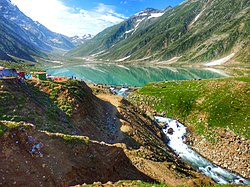Top Qs
Timeline
Chat
Perspective
Lake Saiful Muluk
Mountainous lake in Khyber Pakhtunkhwa, Pakistan From Wikipedia, the free encyclopedia
Remove ads
Saiful Muluk (Urdu: جھیل سیف الملوک) is a mountainous lake in northern Pakistan, located at the northern end of the Kaghan Valley, near the town of Naran in the Saiful Muluk National Park. At an elevation of 3,224 m (10,578 feet) above sea level, the lake is located above the tree line, and is one of the highest lakes in Pakistan.
Remove ads
Location

Saiful Muluk is located in the Mansehra District of Khyber Pakhtunkhwa, about 9 kilometres (5.6 mi) north of Naran,[2][3] in the northern part of the Kaghan Valley. Malika Parbat, the highest peak in the valley is near the lake.[4]
The lake is accessible from the nearby town of Naran during the summer season but access during winter is limited, as heavy snowfall and landslides threaten to cutoff the lake from other regions.[citation needed]
Remove ads
Physical features
Saiful Muluk was formed by glacial moraines that blocked the water of the stream passing through the valley.[5] The Kaghan Valley was formed in the greater Pleistocene Period dating back almost 300,000 years when the area was covered with ice. Rising temperatures and receding glaciers left a large depression where glaciers once stood. Melting water collected into the lake.[citation needed]

Remove ads
Ecology
The lake has rich eco-diversity and holds many species of blue-green algae. Large brown trout are found in the lake, up to about seven kilograms.[6] About 26 species of vascular plant exist in the area, with Asteraceae the most commonly found species. Other species commonly found in the region are: Ranunculaceae, Compositae, Cruciferae, Gramineae, Apiaceae, Leguminosae, Scrophulariaceae and Polygonaceae.[citation needed]
Folklore
Summarize
Perspective
The Lake Saiful Muluk is named after a legendary prince from the tale titled Saiful Muluk, later on put into poem form by the Sufi poet Mian Muhammad Bakhsh.[7] It tells the story of the Egyptian Prince Saiful Malook who fell in love with a fairy princess named Princess Badi ul-Jamal at the lake.[8][1]
The Story of Prince Saiful Maluk (Arabic: قِصَّة سَيْف الْمُلُوْك وَبَدِيْع الْجَمَال, romanized: Qiṣat Saif al-Mulūk wa Badīʿ al-Jamāl) is an Arabic fable, a story of love between a prince and a fairy. It is considered a later addition to the One Thousand and One Nights collection of Arabic fables,[9] and manuscripts of the story are dated to the 17th century.[10] In South Asia, the story was put into Punjabi verse by 19th-century poet and mystic Mian Muhammad Bakhsh. It has also been retold in numerous languages such as Balochi, Bengali,[11] English, Urdu and Punjabi.[12][13][14][15][16] Similarly, according to Turkish scholarship, the narrative is "widely known" in Turkey, Azerbaijan, Tatarstan, Turkmenistan, Kazakhstan, Taranchi, and Bashkortostan.[17]
According to the folklore, Saiful Maluk (whose name means 'Sword of the Kings')[18] was a prince of Egypt. He had significant wealth which he had inherited from his forefathers. The treasure bore two seals: one depicting Saiful Maluk and the other depicting Badi-ul-Jamala[1] (also rendered as Bediülcemal). One night, Prince Saiful Maluk saw in a dream a lake and a fairy. He got up and went to tell his dream to his father, asking him about the place and the fairy. His father told him that he can't meet the fairy as she isn't human, unlike him. However, the longer the prince recollected his dream, the more he was overwhelmed with love for the fairy.[19][20][21][22]
Remove ads
Gallery
Hover the mouse click or tap on the following images to see their captions.
- Lake Saiful Muluk under clouds
- A view of lake in Wortez
- Lake Saiful Muluk in a sunny day
- A full view of Lake Saif-ul-Muluk
- Lake Saif ul Malook in May 2017
- The lake freezes over in winter
- Lake Saif ul Muluk in December 2012
- Tourist point with Lake
- A boat in Saiful Maluk Lake
- Lake Saif-Ul-Mulook, Kaghan Valley, Pakistan
- Lake Saif-Ul-Mulook at night
- Lake Saiful Malook Pakistan
Remove ads
See also
- Lulusar Lake
- Katora Lake
- Dudipatsar Lake
- Mahodand Lake
- Ratti Gali Lake
References
External links
Wikiwand - on
Seamless Wikipedia browsing. On steroids.
Remove ads















